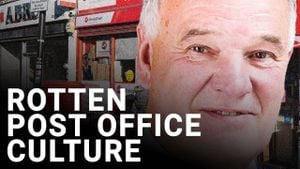California's thriving hemp industry is at the crossroads as iconic comedy duo Cheech and Chong join several other businesses to challenge new regulations limiting THC content in hemp products. Filed against the state’s public health department, the lawsuit seeks to condemn the emergency rules enacted by Governor Gavin Newsom, which currently prohibit the sale of hemp-derived foods and supplements with any detectable THC.
This ban, reportedly introduced to mitigate risks for youth consumers, includes stipulations such as requiring individuals to be 21 or older to purchase hemp products and restricting servings to just five per package. The legislation, announced by Newsom earlier this month, is being positioned as temporary through March 2025, during which lawmakers are expected to draft more comprehensive guidelines.
While the state maintains its stance on protecting public health, the lawsuit contends the emergency regulations could devastate the burgeoning hemp industry, which many local businesses rely on to survive. According to reports from the Los Angeles Times, the owners of various hemp companies assert the ban could result in millions of dollars lost and potential closures.
"These regulations will dismantle small business operations and disrupt access to safe hemp-based products used by many Californians, including veterans seeking relief from service-related anxiety and pain," argues Jonathan Miller, General Counsel for the U.S. Hemp Roundtable, one of the organizations spearheading the legal action.
Veteran advocates are expressing alarm at the consequences of the new rules, particularly among California's sizable veteran population. Will Wisner, executive director of the Grunt Style Foundation, highlights the dire straits many veterans could find themselves in. "Veterans already face significant challenges; limiting access to effective treatment could exacerbate the problems they face daily," he stated. Wisner emphasizes the beneficial effects of CBD and trace amounts of THC for managing physical and mental health issues.
The cannabis legalization movement has significantly evolved over the past several years, with previous efforts aiming to establish clearer regulations for products derived from hemp and cannabis. Advocates argue if the state wants to protect minors from the harms associated with cannabis products, it must also prioritize those who rely on these therapies for treatment.
The San Francisco Chronicle reports Chief Health Officer Tomás Aragón states during the announcement, "This is about safeguarding our youth. Too many previous products have exploited the absence of regulations, directly targeting younger audiences with popular items like cannabis-infused gummies and edibles. We’re committed to ensuring those products do not find their way to kids."
Critics argue such sweeping regulations take no regard for the wider consequences they hold for those who legitimately require these products for medical purposes. This tension between regulation and accessibility has led to confusion among retailers and consumers alike.
Speaking on the impact of current regulations on the hemp market, Sheila Garrison, owner of Garrison Hemp Farms in California, realigns her business model almost overnight focusing solely on products without THC. She interacts with patients who benefit from CBD products, sharing her frustration with the sudden changes. "People don’t understand the difference between THC and CBD; these products help with chronic pain, and now we are faced with potentially alienated patients due to unnecessary regulations. It feels like I’m fighting for their health, and I’m forced to play by incomprehensible rules introduced at the last moment," Garrison says.
Frustrations resonate deeply within the legislative sphere, where state lawmakers face mounting pressure on both ends of the spectrum to develop rules protectively regulating hemp products without alienation constituents who benefit from them. Future discussions are expected as stakeholders call for the state to listen and collaborate.
Besieged with legal challenges, the proposed temporary restraining order aims to halt the enforcement of these regulations until more permanent solutions can be achieved. The hearing for this restraining order is set for October 10, providing the Hemp Roundtable and plaintive businesses with the opportunity to present their case against what they describe as unreasonable, draconian legislation.
This situation is emblematic of the larger conversation encircling cannabis regulation across the United States. Advocates continue to call for transparent dialogue as many states grapple with the dichotomy of establishing strict regulations to protect public safety without compromising the rights and needs of adult consumers and medical patients. They stress the importance of not undermining the benefits so many Californians derive from these hemp products, especially at such precarious times.
The newly implemented regulations took effect on September 23, making it all the more urgent for hemp businesses to collectively voice their concerns, making the upcoming legal proceedings pivotal. The balance of this budding industry now rests on the resolutions decided upon by both the courts and, eventually, the state legislature as they navigate the complex interplay of health, safety, and consumer rights.



